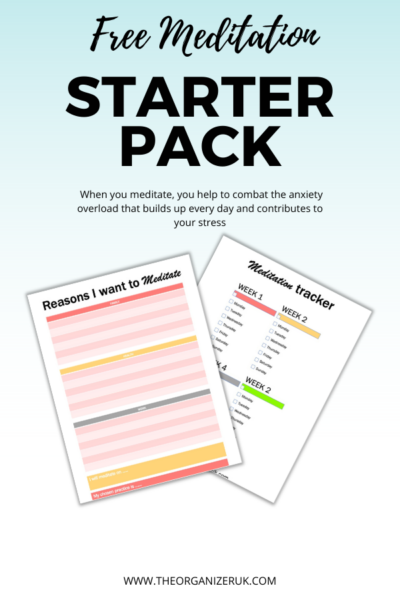Lifestyle
What No One Will Tell You About Menopausal Fatigue
There can be many reasons for menopausal fatigue, in this post we will talk about why you may be feeling tired and how to improve your energy levels. The good news is, if you stay fit and healthy and look after yourself, you can control menopause tiredness quite successfully.
What is menopausal fatigue?
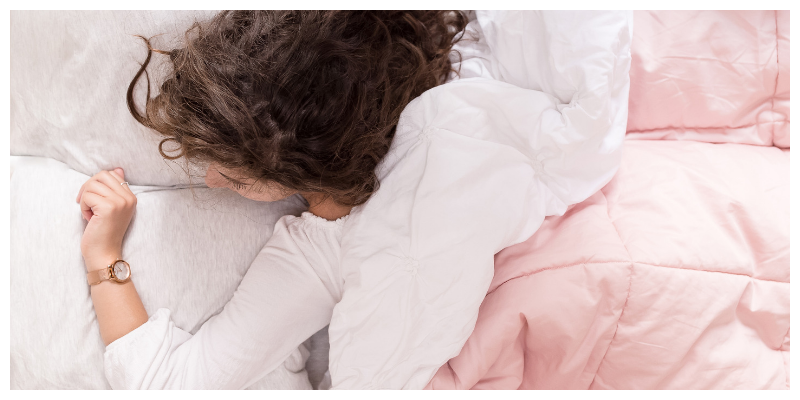
Menopausal fatigue is debilitating tiredness, many perimenopausal, and postmenopausal women experience. It is caused by menopause transition, hormonal changes, and a drop in Estrogen levels. It is very common for some women to experience such extreme menopause fatigue that makes everyday tasks very challenging, leading to anxiety and worry as exhaustion takes over. It is common for menopausal women to feel weak and exhausted, with some memory loss and irritability.
What is peri-menopause
Perimenopause is when your body is experiencing changes in hormone levels. These changes lead to menopausal symptoms, such as fatigue and tiredness during perimenopause. During this time, you may find your periods are more erratic, and you start to experience other varying symptoms such as :
- Menopausal migraine
As the ovaries produce less Oestrogen, changes in hormone levels can trigger menopausal Migraines, which can leave you feeling completely wiped out.
Struggling to look after the needs of the family, working, and keeping on top of the housework, while battling a three-day migraine can lead to chronic fatigue. Migraines were among the first signs of the menopause for me, although it took me and the GP six years to figure it out! - Night sweats
Night sweats are often one of the first signs of menopause, and menopausal night sweats are due to a fall in Oestrogen levels, which in turn throws the function of the hypothalamus or the body’s thermostat off course.
Night sweats can awaken women during the night, sometimes ten times a night or more. Menopausal womenfind that they awaken to discover themselves, and the bedsheets soaked in sweat, often requiring them to change the bedding before going back to sleep. Disturbed and broken sleep is a massive factor in menopausal fatigue and can be very distressing for many women going through the menopause. - Hot flushes
Hot flushes, also known as hot flashes, can be exhausting as they can happen during the day and at night, making everyday activities very uncomfortable and maintaining a comfortable body temperature difficult. They may also cause one to wake several times during the night sweating.
- Heart palpitations
Heart palpitations during the menopause can be stressful as they can leave you feeling weak and short of breath. They can be particularly distressing when they happen at night and can leave you feeling light-headed and slightly faint.
- Weight gain
Weight gain during menopause is widespread. The struggle to carry extra weight can put pressure on the back and joints, making everyday tasks very painful, stressful, and exhausting and can often lead to menopause fatigue.
- Disrupted sleep patterns
Loss of sleep during the menopause can be a massive factor in menopausal fatigue. Night sweats can cause a lack of sleep, anxiety, drop in Oestrogen levels, all of which can keep you awake for the best part of the night and make it impossible to get back to sleep once again. Often someone who is going through the menopause or perimenopause may find that they are only able to sleep for 2-3 hours per day, and this can make daily life a real struggle.
- Sleep apnea
They are sometimes caused by a reduction in the hormones which play a role in keeping the airways open and maintain muscle tone in the throat. Excessive weight gain during perimenopause may be responsible for chronic perimenopause fatigue.
- Menopausal joint pain
Estrogen helps to reduce inflammation, and as our estrogen levels decrease, we may experience joint pain. Joint pain may arise in the knees, hips, shoulders, ankles, neck, and hands and may be made significantly worse by being overweight. You may find that old injury may start to flare up. Read more about how to deal with menopausal aches and pains here.
- Coronary artery disease
Women who are peri-menopausal and menopausal are more at risk of developing coronary heart disease or a stroke because the blood vessels are less protected due to lower Oestrogen levels. Estrogen helps protect different parts of the body, such as the heart and the blood vessels.
The risk factors for coronary heart disease are:
• High LDL cholesterol
• Low HDL cholesterol
• High blood pressure
• Family history
• Obesity
• Smoking
• Diabetes
• Being postmenopausal - Low iron levels
Sometimes during perimenopause, women may experience heavy periods and flooding, which can cause low iron levels and sometimes lead to anemia and menopausal fatigue.
- Aches and pains
Pain can cause discomfort while sleeping and doing everyday activities; this can lead to sleepless nights. Being unable to exercise can cause weight gain, which also contributes to menopausal fatigue.
- Anxiety
Hormonal changes during menopause can drive feelings of anxiety and low self-esteem. This can lead to many sleepless nights lying awake tossing and turning, worrying about things.
- Nausea
Feelings of overwhelming nausea caused by menopause can hinder exercise and can make hi-impact activities like running difficult, and this can lead to excess weight gain and therefore lead to menopausal fatigue.
- Vaginal dryness
Many women find that they may need to use lubrication during intercourse to avoid discomfort.
- Brain fog
Brain fog and forgetfulness during menopause can often be mistaken for early-onset dementia or mental health deterioration and can be a terrifying symptom for many women. It can be overwhelming and exhausting.
- Weight gain
Menopausal fatigue and weight gain come hand in hand as the more weight you carry, the harder it is to exercise and more tired you become, then, you may start to find comfort in food, and the whole vicious circle begins again.
- Depression
Low self-esteem, lack of confidence, and weight gain can all contribute to depression during menopause. If you suspect you or someone you know may be depressed, seek help from your GP immediately.
- Hairloss
Changes in hair and skin are due to hormone changes and levels of Oestrogen falling. There are some excellent vitamins for menopause, which can help with skin and nail problems.
- Numbness and tingling
Many women experience tingling and numbness in their extremities. Some may experience cold hands and feet or the feeling of cold water on their skin. Some may experience a feeling like an electric shock and very itchy skin. Read more about menopausal numbness and tingling here
- Body odor
Read more about embarrassing menopausal body odour here
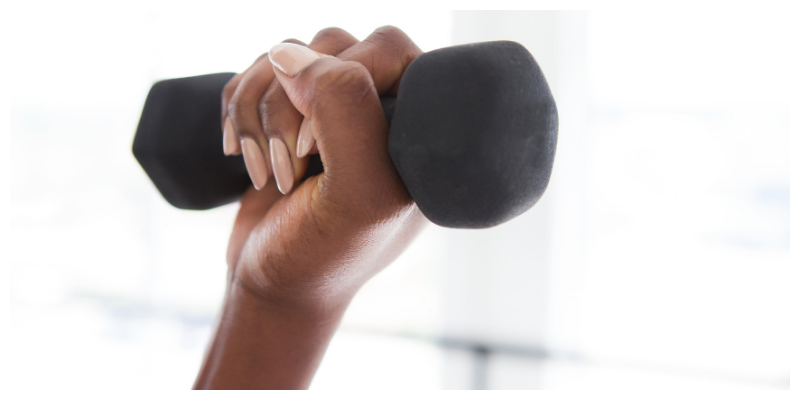
If you are wondering if you are perimenopausal, you can always ask your GP for a menopause test, which is a simple blood test to check your hormone levels.
What is post-menopause?
When you are post-menopause, it means that you haven’t had a period for over a year and it’s safe to say your periods have stopped. Most postmenopausal women may find that they still have many of the symptoms listed above, which may continue for several years such as postmenopause extreme fatigue, hot flashes and postmenopausal tiredness.
To find out more about menopausal aches and pains read this post.
For more info on self care read this post
How I beat menopausal fatigue.
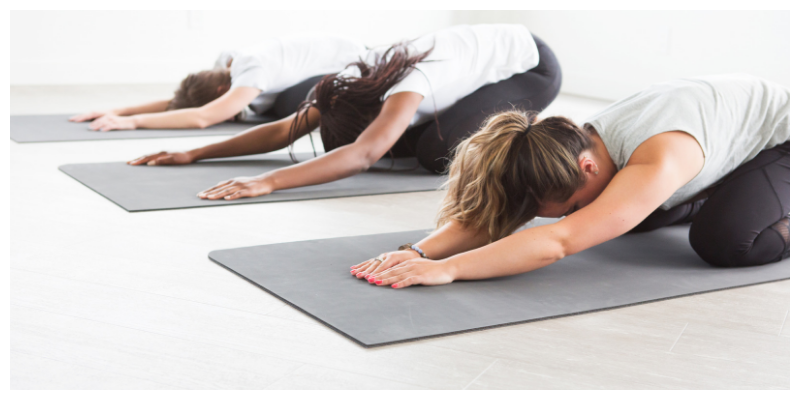
Every time I went to bed, I suffered from heart palpitations these were really scary for me as I have always been fit and healthy with loads of energy.
I was certain the heart palpitations and feelings of panic were caused by due excess weight gain that occurred during menopause. I decided I needed to make some lifestyle changes, and I’ve listed the things I tried to fight menopausal tiredness and fatigue.
Vitamins for menopause fatigue
The first thing I tried to combat perimenopause fatigue was vitamin supplements and herbal remedies
- Black Cosh: this helped slightly with the extreme hot sweats, but was not an effective menopause fatigue treatment. There has been more than one study to show Black Cosh to have worrying side effects, so I decided to stop taking it.
- Starflower: I found absolutely no relief to any of my menopause symptoms or extreme menopause fatigue after taking starflower.
- Magnesium: taking magnesium did help me to sleep slightly better but not so significantly that it cured my hot sweats and tiredness.
- Sage: I found this to be no help with perimenopause fatigue or post-menopause fatigue.
- CBD oil: taking CBD oil helped with menopause aches and pains. However, it didn’t help with exhaustion, and it was very costly, so I decided it wasn’t worth the cost.
Sadly, none of the natural menopause fatigue remedies worked for me, however, I do know many women who find the natural supplements work very well for them.
Diet
I decided to try to reduce bloating and increase my energy by changing my diet, and I decided to cut out:
- Junk food
- Sweets
- Sugar
- Bread
- Rice
- Pasta
I tried to eat as much raw food as possible, and this worked well for me. I felt a whole lot better almost immediately. I had tons more energy, lost weight, my eyes, skin and hair looked healthier. I no longer had bloating, and it helped with my achy joints.
I continue to eat well and dislike the way I feel when I don’t follow this way of eating, even if it’s just for one day.
The gym and exercise
I used to be a real gym bunny in my twenties, but I stopped regularly going when the kids came along.
I only ever used my gym membership to take the kids swimming.
I longed to go to the gym, lift weights and join in with the classes, but I was too embarrassed to go alone. I recognised one day that I was hindering myself from doing something I wanted to do, so I decided to bite the bullet and go alone.
I started by simply walking on the treadmill for 30 minutes per day, then I decided to use some weights, and after a few weeks, I tried some classes. I did Zumba, Legs Bums And Tums, and Body Attack, and it was fantastic fun. I started making friends in the classes and found the support very motivating. It wasn’t long before I ditched the treadmill and just did the classes. I soon found that I felt so much better, had masses of energy and the majority of my aches and pains seemed to clear up.
Daily exercise was the only thing that increased my menopause energy dramatically, and it is something I continue to do several times a week.
To find out how to practice more self-care techniques without even leaving the house, click here!
If you’re not already a subscriber to my list I’ve created this amazing FREE STARTER PACK of printable loveliness! Included is:
- Reasons I want to meditate
- Meditation tracker
What are you waiting for? Whether you’re at the start of your self-care journey or just need a little boost, these FREE printables will help to make time for yourself a little easier! Click here ![]() to subscribe to our weekly updates!
to subscribe to our weekly updates!
Read how to include 10 minutes of meditation into your day here
Frequently asked questions
Many women experience fatigue menopause symptoms during perimenopause and right through to post-menopause. There is no exact length of time that fatigue lasts during the menopause, as everyone is different, but you should see your GP if you are concerned about your symptoms.
Menopause tiredness is one of the most common menopause symptoms.
Chronic Fatigue with menopause is prevalent in a lot of women and can be caused by many symptoms, as outlined above.
Does perimenopause make you tired? Perimenopause and fatigue go hand in hand, as your body’s hormones start to change, menopause exhaustion symptoms get more numerous.
You could visit your GP who may prescribe HRT, or you could try some natural menopause fatigue supplements or remedies. There is no rule for how long menopause tiredness with last as each person’s symptoms are very different from the next.
Menopause does tend to bring on feelings of low self-esteem and anxiety.
The menopause may cause osteoporosis and loss of muscle mass. Regular exercise can help reduce the loss of bone density and muscle mass.
Fluctuations in hormone levels may make you feel nauseas, especially when you are exerting yourself .
HRT or hormone replacement therapy, exercise, good health and dairy, which helps with bone strength, can call help with menopause and fatigue. You should discuss your options with your GP who will help to advise which option is best for you.
For more info on menopause symptoms check out this link
Pin it for later!
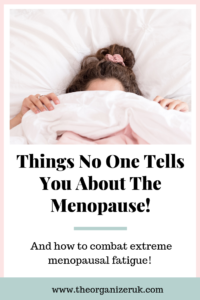
How do you deal with menopause and fatigue? Drop us a line in the comments!

